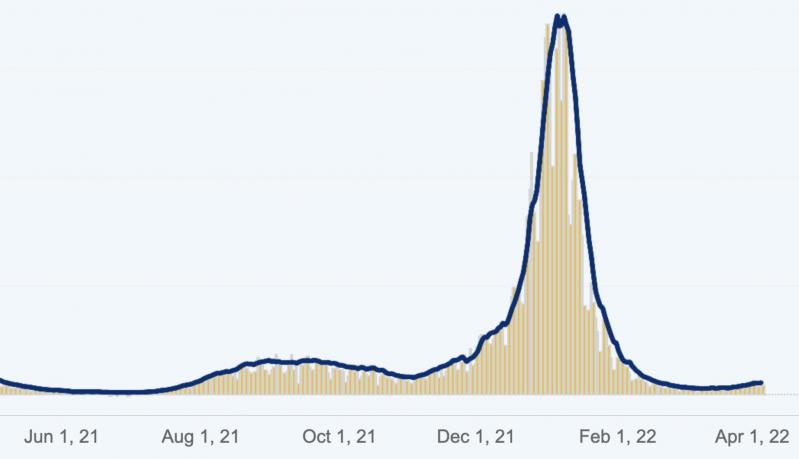Covid is not over.
Despite the feeling of calm that has settled in after mask mandates were lifted, despite the significantly lower case numbers and deaths across the United States, Covid is not finished with us.
Or we with it.
To the contrary, the United Kingdom has been struggling with rising hospitalizations for the past few weeks as the sub-variant of Omicron, BA-2, has hit the nation hard. Shanghai has recently enacted its most stringent lockdown, by some accounts, since the early days of the pandemic.
And the federal Food and Drug Administration recently authorized a second booster, or fourth vaccine dose, here in the United States for people over 50 in response to evidence that shows waning antibody levels and protection around four months out from a third vaccine dose.
Yet, the general feel in our neck of the woods seems to be that Covid is over. I even have several close friends who have reported this to me with an overwhelmingly understandable zeal in the past few weeks. This has presented a surreal juxtaposition for me, as I've then gone home and grappled with the reports of rising numbers, new variants of concern, and fears that this new feeling of normalcy will lead to less vigilance and less testing, and that this will translate to scenarios where we will be caught off guard by a surge in cases.
It's understandable that a lot of people believe the pandemic is behind us. The media narrative has shifted, as has the message from our state and federal governments. This is a completely reasonable next step as we respond to robust vaccination campaigns in states like New York and new therapeutic agents for treating patients in the outpatient setting and as we pivot toward the next phase of the pandemic.
However, I fear that many people have taken the message of "In areas with low Covid-19 cases and hospitalizations, it's okay to stop wearing a mask if you're vaccinated and healthy" as meaning that this will be a permanent state of affairs moving forward.
That's not the case. These steps are only reasonable if we are vigilant for any possible next wave and take steps to address it as soon as it is on the horizon. This type of thinking requires maintaining the sort of vigilance and readiness that have been the hallmark of the last two years, and believe me — if anyone understands how overwhelming it feels to have to continue this, particularly as so many are returning to "normal" life, it's me.
But simply wanting things to be otherwise will not change the facts. It will not keep variants from arising, particularly in areas where the virus is allowed to run rampant and/or where vaccinations are low. It will not keep people from getting sick, or keep high-risk patients who are sick from ending up in the hospital.
Simply wanting will not keep more people from dying.
What will do that is vigilance and the careful steps that must be taken in response to vigilance: staying up to date on Covid-19 vaccinations per the latest guidelines; considering wearing a mask when in crowded public places or when around high-risk friends or family members, particularly if you are not vaccinated; getting tested when exposed (ideally with a P.C.R.) or when feeling sick (with a P.C.R. if available and/or with serial home antigen tests), and consulting with your physician if you do test positive to see if any of the current monoclonal antibody or oral antiviral treatments that are available would be reasonable for you.
More than at any other point in the past two years, we have the tools necessary to fight Covid-19. Let us hope we will not forget that in our desperate need for things to return to normal and that we will continue to do everything we can to keep ourselves and our loved ones safe.
Joshua Potter, D.O., a physician with Stony Brook Southampton Hospital's Meeting House Lane Medical Practice, oversees the practice's Shelter Island office. He specializes in family and neuromusculoskeletal medicine. Opinions expressed in this column are his personal and professional views and not necessarily those of his employer.

